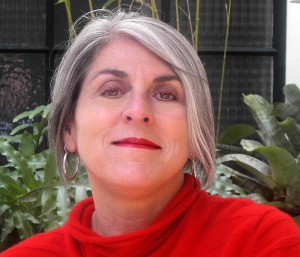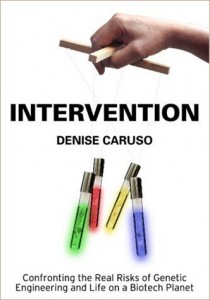 Denise Caruso is famous, and definitely an industry icon – or rather a multi-industries icon. Yet, do we always know “well-known” people? No. The fact is that as we work ourselves like crazy, we often don’t have enough energy left to scope out the extent or the depth of the dedication that our friends put into their own work. This is what I fully realized when I read Denise’s stunning book Intervention: Confronting the Real Risks of Genetic Engineering and Life on a Biotech Planet, which won a silver medal at the 2007 Independent Publishers Book Awards for science writing. The title reveals unambiguously what it is about, and if you want some sobering, hair-raising first-hand understanding of our existential slippery slopes, read this book: it’s a great science-fiction-turned-into-our-reality-autopsy essay that many entrepreneurs in life-science (and in technology altogether) may want to leverage as a springboard for creative brainstorming.
Denise Caruso is famous, and definitely an industry icon – or rather a multi-industries icon. Yet, do we always know “well-known” people? No. The fact is that as we work ourselves like crazy, we often don’t have enough energy left to scope out the extent or the depth of the dedication that our friends put into their own work. This is what I fully realized when I read Denise’s stunning book Intervention: Confronting the Real Risks of Genetic Engineering and Life on a Biotech Planet, which won a silver medal at the 2007 Independent Publishers Book Awards for science writing. The title reveals unambiguously what it is about, and if you want some sobering, hair-raising first-hand understanding of our existential slippery slopes, read this book: it’s a great science-fiction-turned-into-our-reality-autopsy essay that many entrepreneurs in life-science (and in technology altogether) may want to leverage as a springboard for creative brainstorming.
 Intervention: Confronting the Real Risks of Genetic Engineering and Life on a Biotech Planet
Intervention: Confronting the Real Risks of Genetic Engineering and Life on a Biotech Planet
When Denise told me, in early 2000, that she was building a non-profit foundation called The Hybrid Vigor Institute, I wasn’t quite sure what to make of it. Although we were starting to see welts on the Internet hot air balloon, it was not easy to get the reason behind such a sharp turn from someone who had carved for herself a big name as a technology journalist, columnist, and analyst – at Infoworld, Electronics, Macintosh Today, The New York Times for five years and, more occasionally, multiple other publications ranging from WIRED to the Wall Street Journal. It is only a year later, in 2001, that this move became consistent with who she was/is – and by the same token, this is also when I fully grasped the scope of what she had done in 1999 and many years before. She was telling me that her consultancy for the Pew Charitable Trusts (which focused on the development of standards and practices to improve credibility on the Internet) had morphed into the Consumer Web Watch, funded by Pew, the Knight-Ridder Foundation and George Soros’ Open Society Institute. When she had created that consultancy in 1999, I had simply looked at it as a logical sequel to her fantastic bi-weekly column for the Monday Information Industries section of The New York Times, which she had with great foresight named “Digital Commerce.” Now I was getting the picture.
As I recount this, I feel the silliness we usually feel when we suddenly realize that we have, if not missed, then at least not clearly formulated for ourselves a key characteristic of someone to whom we are close. It took me over ten years to see a common-thread-and-thrust through various initiatives that I had branded as “typical Denise.” Her insatiable thirst to know as well as her rare ability to systematically debunk BS as she used to interview entrepreneurs or industry luminaries were more than challenging them to get the truth out of them. She wanted to know what they were really doing: if/how they were really changing the world and if/how they had a clear assessment of if/how they might impact that world – or if they were only in to serve their personal or business-centric interests. All of a sudden, her sabbatical from her New York Times column in 1997 to serve as a visiting scholar at Interval Research in Palo Alto (a think tank run by David Liddle) as well as multiple academic/research positions that she took, made sense to me. She wanted to know more and better all the time.
Denise lives her life as a die-hard advocate for always more knowledge, regardless on what the technology domain is about – just as she was an early advocate of the First Amendment rights online in 1995. Her all-out advocacy style is as far removed as possible from preachy and moralistic considerations or calls for vaporous reasonableness. Yes, new technologies pose ethical and sometimes life threats. We can’t simply “abstain” as a remedy to unwanted proliferation. We can act. Denise has the pull-no-punches- approach of people who truly love technologies and question technologies all the more passionately as they are more convinced that they are also the means to address the shortcomings that inventions often generate.
Marylene Delbourg-Delphis
PS- To end on a completely different note, she is not even remotely related to one of the most famous Italian tenors of all times, Enrico Caruso.
For more details about The Hybrid Vigor Institute: http://hybridvigor.org/
For a general overview of Denise’s biography: http://en.wikipedia.org/wiki/Denise_Caruso

1 response so far ↓
1 Blog Grade A Entrepreneurs: Great Tech (and Non-Tech) People | Apple Iphone and Tech News // Feb 20, 2009 at 12:36 pm
[…] Denise Caruso: The new face of advocacy: More innovation to address the shortcomings generated by in… […]
Leave a Comment